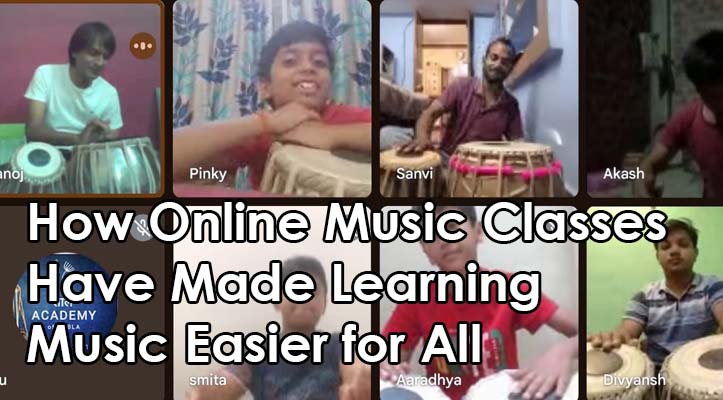How Online Music Classes Have Made Learning Music Easier for All
In today’s fast-moving digital world, learning music is no longer limited by time, location, or traditional classroom walls. The rise of online music classes has opened up a world of opportunity, making music education more accessible, flexible, and inclusive than ever before.
Whether you're a beginner hoping to learn your first rhythm or a seasoned musician refining your skills, online learning platforms have transformed how we approach music.
1. Music is Now Just a Click Away
One of the biggest breakthroughs of online music education is accessibility. Earlier, students had to live near music schools or rely on local teachers. Now, with just a smartphone or laptop and an internet connection, students can connect with expert musicians and teachers from across the globe—right from their living rooms.
From tabla and Western instruments, everything is now just a click away.
2. Flexible Learning on Your Own Schedule
Online classes allow students to choose time slots that suit their personal schedules. This flexibility is ideal for:
- Working professionals
- School-going children
- Homemakers
- International students in different time zones
You no longer need to miss lessons due to travel or other commitments. Many platforms also offer recorded sessions, so students can learn at their own pace and revisit lessons any time.
3. Affordable and Cost-Effective
Online learning often reduces the cost of tuition, eliminates commute expenses, and requires less physical infrastructure. Many platforms offer:
- Free trial classes
- Group sessions at lower rates
- Discounted course bundles
This makes high-quality music education more affordable for families and individuals.
4. Learn from the Best, No Matter Where You Are
Students can now choose their ideal teacher, regardless of geographic boundaries. Whether it's a renowned tabla maestro in Mumbai or a vocal coach in New York, online learning bridges the gap between students and experts.
You also get the opportunity to explore different styles, techniques, and instruments that may not be available locally.
5. Personalized Attention with Modern Tools
Online platforms use digital tools like:
- Tuning apps
- Metronomes
- Lehra or rhythm accompaniment apps
These tools enhance the learning experience, helping students improve faster. One-on-one video sessions also ensure that students receive personalized feedback and guidance.
6. A More Comfortable and Inclusive Learning Space
For many learners—especially shy beginners or adults returning to music—online classes offer a comfortable, non-judgmental environment. You can practice at home, make mistakes, and grow at your own pace.
Moreover, students with special needs or mobility challenges can participate more easily from home.
7. Building Global Music Communities
Online music academies host virtual recitals, student showcases, masterclasses, and jam sessions. These foster a sense of community, encourage collaboration, and keep learners inspired.
Music is no longer an isolated journey—it’s a shared global experience.
Conclusion
The digital age has democratized music education. Online music classes have made it possible for anyone, anywhere to learn, grow, and connect with the world of music. Whether you're picking up an instrument for the first time or polishing your performance skills, online learning offers flexibility, quality, and convenience that traditional methods often cannot.
So if you've ever dreamed of learning music, now is the best time to start—your teacher is just a screen away.

